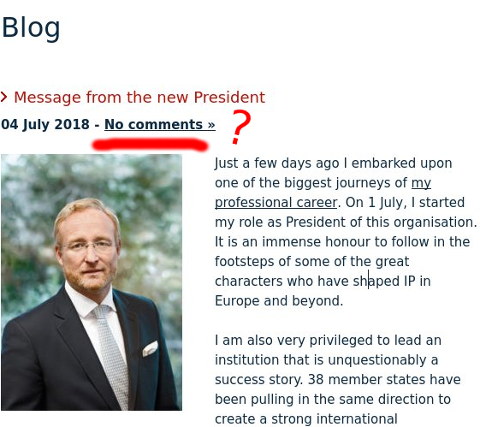

THE observation that pendency was intentionally mistaken for quality goes a long way back. Staff representatives took note of it. Nothing has actually changed since Battistelli left, neither in terms of working atmosphere nor purely technical terms.
The three patents of Invossa that the company sought were “gene therapy using transforming growth factor (TGF)-ò,” “mixed-cell gene therapy,” and “cartilage regeneration using chondrocyte and TGF-ò.”
The EuropThe three patents of Invossa that the company sought were “gene therapy using transforming growth factor (TGF)-ò,” “mixed-cell gene therapy,” and “cartilage regeneration using chondrocyte and TGF-ò.”
The European Patent Office (EPO) gave the nod for the patent on “mixed-cell gene therapy” last year in Europe except for six countries, 14 years after the company applied for the patent registration on March 28, 2003. However, the EPO refused to approve the other two patents, apparently due to unmet conditions under the European patent law, officials said.ean Patent Office (EPO) gave the nod for the patent on “mixed-cell gene therapy” last year in Europe except for six countries, 14 years after the company applied for the patent registration on March 28, 2003. However, the EPO refused to approve the other two patents, apparently due to unmet conditions under the European patent law, officials said.
"We cannot (...) live in isolation, but instead form part of a rich IP ecosystem, with many different actors...". Back in July this year, the President of the European Patent Office (EPO), António Campinos, stressed the importance of intensifying co-operation between patent offices. The overall aim is to increase the efficiency of the filing and examination process for patents worldwide, and better meet user expectations in terms of quality,
About 4% of European patents are opposed and, although the percentage has been declining, the annual number of oppositions filed at the European Patent Office (EPO) seems relatively consistent at around 3,000 to 4,000, since total granted patents are rising. In 2017, 3.7% of granted European patents were opposed, and the EPO issued 4,070 opposition decisions, of which 73% were upheld in amended form or as granted. However, EPO oppositions tend to be costly and time consuming. Currently, the EPO is aiming to reduce the average processing time of standard oppositions from two years, in 2016, to 15 months by 2020, but the timescales, uncertainty and cost may be a deterrent to filing an opposition at the EPO, especially for smaller or medium sized entities.